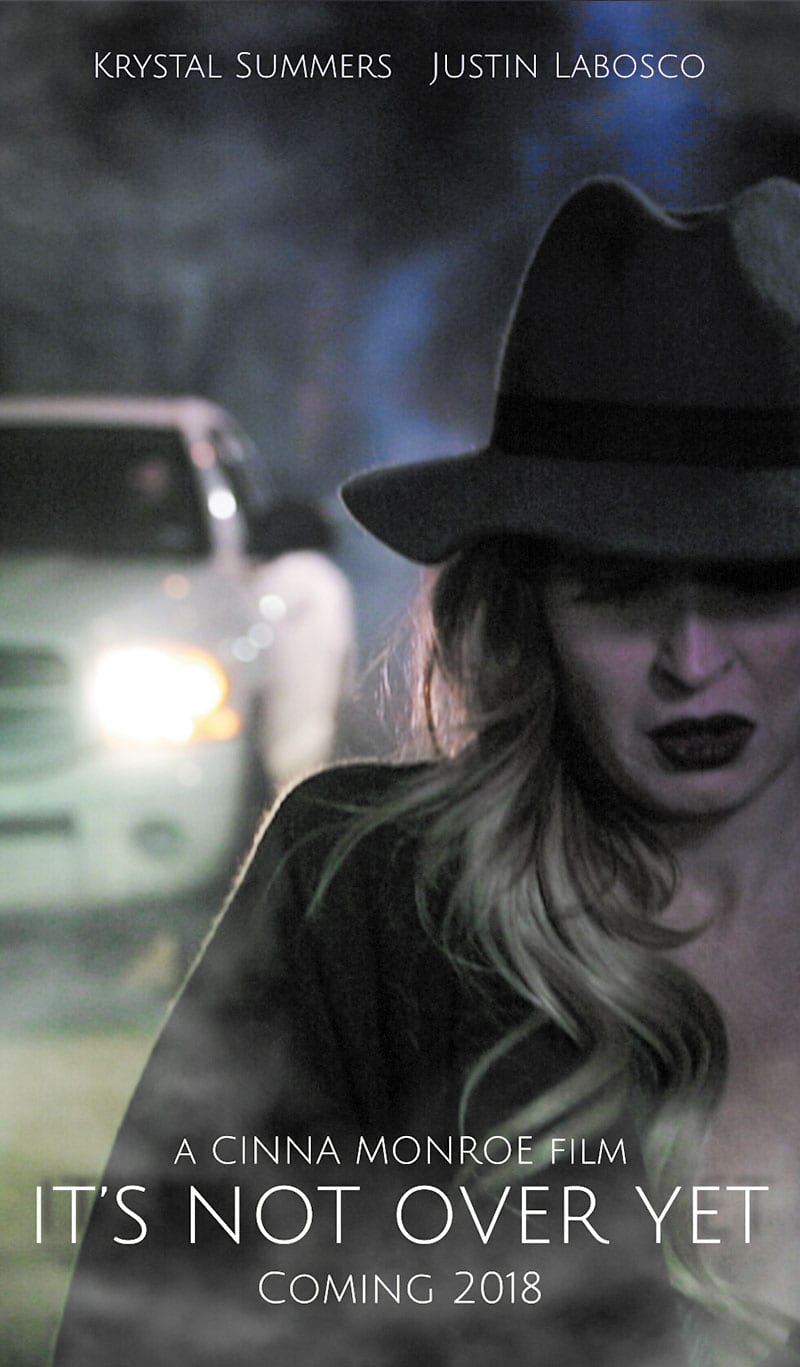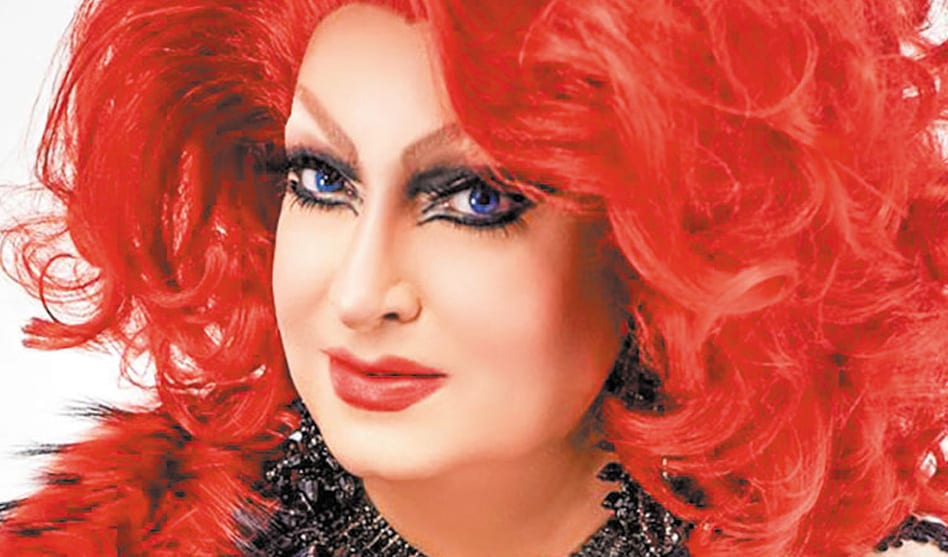New short film from Cinna Monroe, starring Krystal Summers, shines an unforgiving light on anti-trans violence
Tammye Nash | Managing Editor
nash@dallasvoice.com
This is not THE trans story. This is just MY trans story.”
That’s the opening line in the new short film, It’s Not Over Yet, which recounts a day in the life of a transgender woman named Karen.
But it isn’t just any day in her life. It is the last day of her life.
As the seven-and-a-half-minute-long film begins, Karen — played by Dallas actress/performer Krystal Summers, is relaxing after her day job as a hair stylist, playing — quite beautifully — a baby grand piano and enjoying a glass of red wine as her boyfriend, Justin is hard at work in the kitchen, (played by Justin Labasco) finishing up an elegant dinner.
They sit together at the dining table, chatting, about their day and their plans for the next day as they eat. Karen answers a call from a client who wants to set an appointment for a haircut, and Justin encourages her to take his truck instead of calling Uber for a ride that evening when she heads for the nightclub where she performs.
Then Justin heads to bed to rest up for the next morning, when he has promised to help a friend move, and Karen heads for the club in Justin’s truck. As usual, the gayborhood is crowded, and she has to park several blocks away, in a dimly-lit area. But as she walks toward the club, pulling her wheeled bag behind her, she is confronted by two men and a woman, out for a night of trans-bashing.
At this point, I’ll just say that Karen never makes it to the club. As she said in the introductory voice-over: “The day had started like any other day. I didn’t know it would be my last.”
Before the closing credits begin to roll, the filmmaker drives her point home: “At least 27 transgender people were murdered in the United States in 2017.” And the count for 2018 already stands at at least two.
It’s Not Over Yet is the creation of Texas drag queen filmmaker Cinna Monroe, who said this week that she hopes to get the short included in as many film festivals as possible this year. But she’s not looking to get it into the LGBT festivals; Monroe said she wants to take her message to a mainstream audience.
“All year long last year, I kept seeing on my Facebook page posts about yet another trans death, another trans woman being murdered,” Monroe said. “By the end of the year, there were 27 trans people murdered in the U.S., and that’s just in 2017.
“But,” she continued, “outside of the gay community, outside of the gay press, you don’t even hear about it. I am a drag queen filmmaker, and I am a trans ally, and I am trying to bring a light to bear on these tragedies, to make people understand what horrible things are happening. I’ve showed this to people, to my cousins and aunts and uncles, my mother — like a lot of [non-LGBT people] none of them were even aware that this was going on.”

Krystal Summers stars in “It’s Not Over Yet.”
Although this isn’t Monroe’s first foray into filmmaking — she created, produced and stars in the 30-minute camp-fest Beaver, which should also be making its way into film festivals around the country this year — it is her debut as a director.
“I was very lucky to be surrounded by some vastly talented people,” she said. “I believe that all the performances really rang true and [co-producer] Austin Williams and [director of photography] Tyler J. Case were just phenomenal.”
(It’s Not Over Yet is a product of Monroe’s Four Horsemen Productions in associated with Alfa Whiskey Entertainment.)
Monroe acknowledged that the story in the short is “a piece of fiction that I have written,” and that while the trans woman in her film is white, most of those murdered — in 2017 and every year — are trans women of color.
“It was a situation where I know Krystal. I’ve worked with her before, and we have a good working relationship. So we made the film with Krystal.”
While the topic of hate crimes and trans-bashing may be new for Monroe, in terms of filmmaking, it’s familiar territory for Summers.
“Trans murders are a huge problem, a huge tragedy,” Summers said. “This film has a very strong message, an important message. It’s a message that people need to hear, and a message that I have wanted to help spread for several years now.
“Yes, it is really the same message that was in ‘that other film’ I did a few years ago,” she continued, referring to her starring role in Israel Luna’s controversial 2010 trans-ploitation rape/revenge film, Ticked-Off Trannies with Knives.
“That movie had a good message, too. But it was campy and over the top. This is not,” Summers said. “I wanted to do this because it gets the message across in a serious and intense way.”
Summers acknowledges that It’s Not Over Yet is “really hard to watch at the end. But that’s intentional. We really wanted to strike a chord in people. We wanted to create that awareness, for people to really understand” the brutality of anti-transgender hatred and violence.
Summers, like Monroe, stressed that It’s Not Over Yet is not intended to be THE transgender story. It isn’t the truth of every trans person’s life. As she says in the opening voice-over, “Because, you know, we’re all as unique and different as leaves on a tree. But what we all have in common is a desire to be given the same basic respect you’d give any human being as we try to live our authentic, true lives.”
That, Monroe agreed, is the impetus that lies at the heart of the short film.
“I just wanted to try and establish that basic human respect is missing for so many transgender people,” the filmmaker said. “And, for lack of a better word, I am trying with this film to humanize what ‘transgender’ actually means for an audience that really still just doesn’t get it.
“Here is this vibrant, talented, hard-working, wonderful woman, who is contributing so much to society, and she is just brutalized, eradicated by people who fear and hate what they don’t understand.”

















Wow this is an incredible article that is very enlightening because we don’t hear about this type of violence on our local news much less the national news. It is time to educate people and this sounds like a jolt for people to open their eyes because it is happening. I would imagine this is long overdue. Thank you for sharing. I look forward to seeing this hit the film festivals to not only educate but to be an eye opener to make change a reality not just a suggestion.